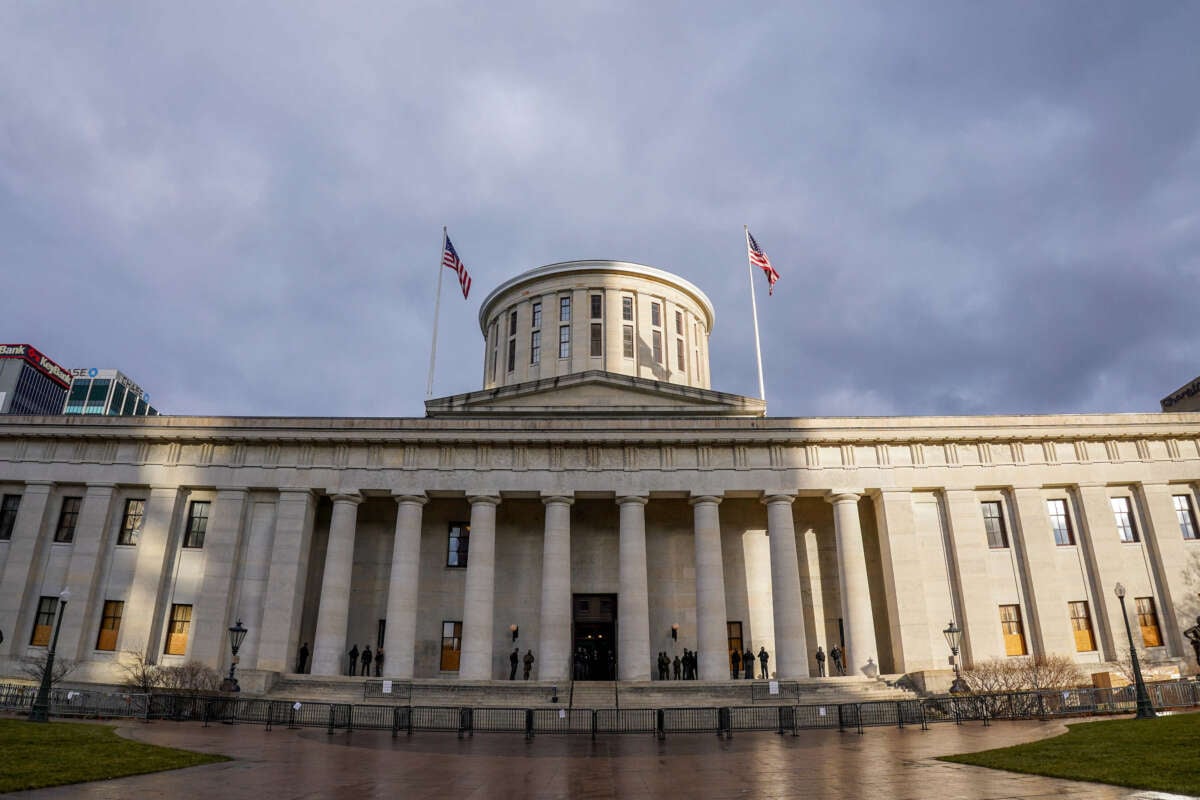On Wednesday, Ohio’s legislature became the first in the country to pass an anti-transgender law post-2024 election. The bill, SB104, originally aimed to help dual-enrolled high school students earn college credits, but a provision was added to bar transgender people from using bathrooms aligned with their gender identity on college campuses. Now, Ohio’s legislature has passed the bill on the first day of a lame-duck session. With this move, Ohio joins a small number of states in passing a transgender bathroom ban that includes adults — following a $215 million anti-trans ad campaign, many of whose ads ran heavily in the state, targeting transgender rights.
The bill declares that “no institution of higher education shall knowingly permit” transgender people to use bathrooms aligned with their gender identity. Originally passed in June, the bill’s future looked uncertain leading up to the 2024 election. But after the election, primary sponsor Adam Bird signaled that targeting trans and queer communities would be a top priority for Ohio’s legislature, calling for state investigations into official diversity initiatives and drag shows. Now, his bill is set to be one of the nation’s most restrictive toward transgender people.
While most states with bathroom bans restrict them to grade school settings, only nine states currently bar transgender adults from some public bathrooms — Alabama, Florida, Kansas, Louisiana, Mississippi, North Dakota, Texas (Odessa), Utah, and now Ohio will become the tenth. Notably, this ban extends to private colleges as well as public ones, making it one of the first adult bathroom bans in the U.S. to apply to private institutions.
Maria Bruno of No Extremism Ohio noted in a Twitter post, “Ohio Senate Repubs just passed a bill that requires all Ohio schools, public and private, including PRIVATE COLLEGES to adopt & enforce an anti-trans bathroom policy. [It] includes schools like CCAD & Antioch, private colleges [with] a majority LGBTQ student body.”
Indeed, the bill would apply to colleges like Antioch, of which 82% of students identify as LGBTQ+ and 16% identify as transgender. Some private colleges are known for being safe spaces for LGBTQ+ people, and thus attract a student body that seeks them for safety. Now, even private colleges like Antioch will be forced to ban transgender girls from girls restrooms in the state of Ohio.
Kaleidoscope youth center, an LGBTQ+ youth advocacy group, called the bill’s passage undemocratic and malicious, stating, “We are extremely disgusted by the passage of Senate bill 104. The “Protect All Students Act” being added to the unrelated topic of the College Credit Plus Program is a demonstration of underhanded and dishonest leadership. The bathroom ban’s maliciously expedited and undemocratic movement through the legislature lacks transparency. This policy is not only dangerous and unnecessary, it is a blatant display of discrimination,” and followed up with a call for Ohio voters to contact Governor Mike DeWine’s office.
Anti-trans bathroom bans, gender-affirming care bans, and similar restrictions have a profound impact on young people’s mental health. A CDC study found that 25% of young transgender people attempted suicide in the past year. Another study, published in Nature Human Behavior, showed that such laws can lead to an up to 72% increase in suicide attempt rates. Following the recent election, LGBTQ+ crisis hotlines reported a 700% surge in calls as transgender individuals brace for harsh crackdowns in the aftermath of the election. Ohio’s latest legislation has brought those fears to reality.
Many transgender people are watching closely to see what their state legislatures will do next. Ohio could be an early indicator of what to expect from Republican-controlled states emboldened by what they interpret as a mandate to target transgender rights through laws that restrict public life. With several state prefiling deadlines approaching, the coming weeks will reveal more about what the landscape holds for transgender people at the state level. This latest Ohio bill now heads to Governor DeWine’s desk — though he has vetoed anti-trans bills in the past, those vetoes were ultimately overridden.
This piece was republished with permission from Erin In The Morning.
Angry, shocked, overwhelmed? Take action: Support independent media.
We’ve borne witness to a chaotic first few months in Trump’s presidency.
Over the last months, each executive order has delivered shock and bewilderment — a core part of a strategy to make the right-wing turn feel inevitable and overwhelming. But, as organizer Sandra Avalos implored us to remember in Truthout last November, “Together, we are more powerful than Trump.”
Indeed, the Trump administration is pushing through executive orders, but — as we’ve reported at Truthout — many are in legal limbo and face court challenges from unions and civil rights groups. Efforts to quash anti-racist teaching and DEI programs are stalled by education faculty, staff, and students refusing to comply. And communities across the country are coming together to raise the alarm on ICE raids, inform neighbors of their civil rights, and protect each other in moving shows of solidarity.
It will be a long fight ahead. And as nonprofit movement media, Truthout plans to be there documenting and uplifting resistance.
As we undertake this life-sustaining work, we appeal for your support. Please, if you find value in what we do, join our community of sustainers by making a monthly or one-time gift.
